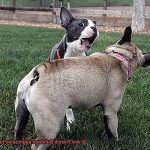Are French Bulldogs an unhealthy breed?
French Bulldogs have stolen the hearts of dog lovers around the globe with their adorable bat-like ears and irresistible charm. But let’s get real for a moment – are these cuties actually an unhealthy breed? Despite their popularity, French Bulldogs, or “Frenchies” as they’re affectionately called, do come with a few health concerns that potential owners should be aware of.
With their short snouts and flat faces, French Bulldogs fall into the brachycephalic breed category. These distinctive features not only make them undeniably cute but also contribute to some unique health challenges.
In this blog post, we’ll dive deep into the potential health risks associated with owning a French Bulldog. By relying on credible sources and expert knowledge, we aim to give you a well-rounded understanding of the breed’s health status. Our goal is to provide you with all the information you need to make an informed decision and ensure the well-being of these delightful companions.
So, let’s uncover the truth about French Bulldogs’ health issues and help you navigate your way through this adorable yet potentially concerning world.
What are the Health Issues Associated with French Bulldogs?
Contents
- 1 What are the Health Issues Associated with French Bulldogs?
- 2 Exploring the Breathing Difficulties of French Bulldogs
- 3 Understanding the Skin Problems of French Bulldogs
- 4 Examining Genetic Disorders in French Bulldogs
- 5 Investigating Eye Problems in French Bulldogs
- 6 Minimizing the Risk of Health Problems in French Bulldogs
- 7 Considerations for Potential Frenchie Owners
- 8 Conclusion
It is crucial to be aware of the health issues associated with this breed to ensure the well-being of these beloved furry companions. In this comprehensive overview, we will explore the common health concerns of French Bulldogs and provide valuable insights for owners.
Respiratory Problems:
- Due to their brachycephalic (flat-faced) structure, French Bulldogs often experience breathing difficulties.
- This can lead to snoring, wheezing, and potentially more severe conditions such as brachycephalic airway syndrome or heatstroke.
- Monitor your Frenchie’s breathing and avoid exposing them to extreme temperatures or excessive exercise.
Skin Issues:
- French Bulldogs have sensitive skin that is prone to allergies, dermatitis, and infections.
- Regular grooming practices such as bathing and brushing can help maintain their skin health.
- Ensure a balanced diet that supports healthy skin and consult a veterinarian if any skin issues arise.
Eye Problems:
- French Bulldogs are prone to various eye conditions, including cherry eye (prolapse of the third eyelid gland) and corneal ulcers.
- Regular eye examinations by a veterinarian are crucial for early detection and treatment of potential eye issues.
Genetic Disorders:
- French Bulldogs have a higher risk of certain genetic disorders, such as hip dysplasia and intervertebral disc disease.
- Responsible breeding practices and regular veterinary check-ups can help reduce the risk of these disorders.
Obesity:
- French Bulldogs tend to overeat and have a sedentary lifestyle, making them prone to obesity.
- Maintain a healthy weight through portion control, regular exercise, and a balanced diet to prevent additional strain on their respiratory system and other health issues.
Exploring the Breathing Difficulties of French Bulldogs
French Bulldogs are undeniably adorable with their unique physical features and playful personalities. However, these lovable pups are prone to breathing difficulties due to a condition called Brachycephalic Obstructive Airway Syndrome (BOAS). In this blog post, we will delve into the causes and treatments of breathing difficulties in French Bulldogs to help owners better understand and manage this common health issue.
Causes of Breathing Difficulties in French Bulldogs:
- Brachycephalic Skull: French Bulldogs have a flattened face, known as a brachycephalic skull, which gives them their distinctive appearance. Unfortunately, this physical characteristic also leads to respiratory problems. Their shortened snouts and narrow nostrils make it challenging for them to take in sufficient air, especially during physical activity or in hot weather.
- Elongated Soft Palate: Another factor contributing to breathing difficulties in French Bulldogs is an elongated soft palate. The soft palate is the tissue at the back of the roof of the mouth. When it is too long or thick, it can obstruct the airway and make breathing even more difficult for these dogs.
Signs and Symptoms:
Recognizing the signs of breathing difficulties in French Bulldogs is crucial for timely intervention and management. Look out for the following symptoms:
- Excessive Snoring or Noisy Breathing: While French Bulldogs are known for their snorting and grunting sounds, if these noises become louder or more frequent, it could be a sign that their airway is being obstructed.
- Wheezing and Coughing: If your French Bulldog wheezes or coughs frequently, it may indicate respiratory distress.
- Excessive Panting: Difficulty in regulating body temperature due to compromised airways can cause excessive panting, especially during physical activity or hot weather.
Treatment Options:
The treatment options for breathing difficulties in French Bulldogs depend on the severity of the condition. Here are some common approaches:
- Lifestyle Modifications: In mild cases, lifestyle modifications can significantly alleviate breathing difficulties. Avoiding strenuous exercise, especially in hot weather, providing a cool and well-ventilated environment, and using a harness instead of a collar to reduce pressure on the neck are recommended.
- Surgical Interventions: In more severe cases, surgical procedures may be necessary to address structural abnormalities. These procedures can involve widening the nostrils, removing excess tissue from the soft palate, or correcting other issues contributing to breathing difficulties. However, it’s important to consult with a qualified veterinarian before considering surgery as it may not always be the best solution for every dog.
Understanding the Skin Problems of French Bulldogs
French Bulldogs are beloved for their cute looks and playful personalities, but they are also prone to various health issues, including skin problems. As a responsible French Bulldog owner, it is important to understand the common skin conditions that affect this breed and how to provide proper care. In this article, we will explore the different skin problems that French Bulldogs commonly experience and provide tips on how to keep their skin healthy and happy.
- Dermatitis: One of the most common skin problems in French Bulldogs is dermatitis, which refers to inflammation of the skin. It can be caused by allergies, parasites, or bacterial and fungal infections. Allergic dermatitis is particularly prevalent in French Bulldogs and can be triggered by environmental allergens like pollen, dust mites, or certain foods. If you notice your French Bulldog scratching excessively, developing redness or rashes, it’s important to consult with a veterinarian for proper diagnosis and treatment.
- Pyoderma: Pyoderma is another common skin problem in French Bulldogs. It is characterized by the presence of pus-filled lesions on the skin. Underlying issues such as allergies, hormonal imbalances, or immune system deficiencies can contribute to the development of pyoderma. If you notice any signs of pyoderma on your French Bulldog’s skin, it’s crucial to seek veterinary intervention for appropriate treatment.
- Xerosis: French Bulldogs are also prone to dry and flaky skin, a condition known as xerosis. This can be caused by weather changes, improper grooming practices, or certain medical conditions. Regular moisturizing with pet-safe products can help alleviate dryness and promote healthier skin in French Bulldogs.
- Interdigital Cysts: Interdigital cysts are another skin problem that French Bulldogs may experience. These cysts form between the toes and can cause pain and lameness in affected dogs. While the exact cause of interdigital cysts in French Bulldogs is not fully understood, it is believed to be associated with allergies or other underlying skin conditions. Treatment typically involves managing the underlying cause and providing pain relief.
To provide proper care for your French Bulldog’s skin, it is important to establish a regular grooming routine. Here are some tips to keep in mind:
- Clean their facial folds, ears, and paws regularly to prevent the accumulation of dirt and moisture, which can lead to skin infections.
- Use a gentle and appropriate shampoo during baths to keep the skin clean and minimize the risk of developing skin problems.
- Check for any signs of skin irritation, redness, or rashes during grooming sessions and consult with a veterinarian if you notice anything unusual.
- Ensure your French Bulldog has a well-balanced diet that supports skin health, as nutrition plays a crucial role in maintaining healthy skin.
Examining Genetic Disorders in French Bulldogs
French Bulldogs are beloved pets known for their charming personalities and distinctive physical features. However, their unique characteristics and breeding practices contribute to a higher risk of genetic disorders. As a responsible owner, it is crucial to be aware of these disorders and take proactive measures to ensure the health and well-being of your furry friend.
Brachycephalic Airway Syndrome:
One of the most common genetic disorders in French Bulldogs is Brachycephalic Airway Syndrome. This condition is characterized by respiratory difficulties due to the breed’s short snout and narrow airways. Symptoms include snorting, wheezing, and difficulty breathing, especially during exercise or in warm weather. Regular veterinary check-ups and avoiding strenuous activities can help manage this disorder.
Intervertebral Disc Disease:
Another genetic disorder that affects French Bulldogs is Intervertebral Disc Disease. This condition affects the spinal discs, leading to mobility issues and even paralysis. Symptoms may include back pain, difficulty walking, and loss of bladder control. Early detection through regular spinal examinations and a balanced exercise routine can help prevent severe complications.
Hip Dysplasia:
Hip Dysplasia is another prevalent genetic disorder in French Bulldogs. It occurs when the hip joint does not develop properly, causing pain and difficulty in movement. Regular exercise on even surfaces and maintaining a healthy weight can help manage this condition. In severe cases, surgical intervention may be necessary.
Patellar Luxation:
Patellar Luxation is a genetic disorder that affects the kneecap, causing it to dislocate easily, resulting in lameness. Regular check-ups with your veterinarian and maintaining a healthy weight can help prevent this disorder from progressing.
Eye Disorders:
French Bulldogs are also prone to various eye disorders, including cherry eye, cataracts, and progressive retinal atrophy. These conditions can lead to impaired vision or blindness if left untreated. Regular eye examinations by a veterinary ophthalmologist are essential for early detection and appropriate treatment.
Skin Allergies and Dermatitis:
Due to their sensitive skin and folds, French Bulldogs are prone to skin allergies and dermatitis. It is crucial to establish a regular grooming routine, including cleaning the folds and using hypoallergenic products to prevent these conditions from occurring.

Von Willebrand’s Disease and Congenital Heart Defects:

Lastly, French Bulldogs are also at risk of genetic disorders such as Von Willebrand’s disease, a bleeding disorder, and congenital heart defects. Regular blood tests and cardiac evaluations can aid in early detection and management of these conditions.
Investigating Eye Problems in French Bulldogs
French Bulldogs are known for their adorable squished faces and expressive eyes. However, these unique features can also make them more prone to certain eye problems. In this section, we will explore the different eye issues that French Bulldogs may face and discuss measures that can be taken to prevent or manage them.
- Cherry Eye: One common eye problem in French Bulldogs is Cherry Eye. This condition occurs when the tear gland protrudes from the corner of the eye, resembling a cherry. It can cause discomfort and irritation for your furry friend. Surgical intervention is typically required to address this issue and prevent further complications.
- Entropion: Another eye problem that affects French Bulldogs is Entropion. This occurs when the eyelids roll inward, causing the eyelashes to irritate the cornea. If left untreated, it can lead to discomfort, redness, and even corneal ulcers. Regular check-ups with a veterinarian specializing in ophthalmology can help detect and address this issue early on.
- Corneal Ulcers: French Bulldogs are also susceptible to Corneal Ulcers. These are open sores on the cornea that can cause pain, inflammation, and even vision loss. Trauma or underlying eye conditions can lead to the development of corneal ulcers. Seeking prompt veterinary care is crucial to prevent further damage and manage this condition effectively.
- Progressive Retinal Atrophy (PRA): PRA is a hereditary eye disease that gradually degenerates the retina, leading to progressive vision loss and eventual blindness in French Bulldogs. While there is no cure for PRA, early detection through regular eye examinations can help manage the condition and slow down its progression.
- Cataracts: Cataracts are another common eye problem in French Bulldogs. They cause cloudiness in the lens of the eye, resulting in blurred vision or even complete blindness. In some cases, cataract surgery may be an option to restore vision and improve the quality of life for affected dogs.
- Dry Eye Syndrome (KCS): Also known as Keratoconjunctivitis Sicca, Dry Eye Syndrome occurs when there is insufficient tear production to keep the eyes properly lubricated. This can lead to discomfort, redness, and potential damage to the cornea if not managed appropriately. Regular eye care, including cleaning and the use of lubricating eye drops, can help alleviate symptoms.
- Glaucoma: Glaucoma is a condition characterized by increased pressure within the eye, which can lead to optic nerve damage. French Bulldogs with glaucoma may experience pain, redness, vision loss, and even blindness. Treatment options include medication or surgery to manage the pressure and preserve vision.
Minimizing the Risk of Health Problems in French Bulldogs
As an expert in the field, I understand the importance of proactive care and attention when it comes to minimizing the risk of health problems in French Bulldogs. These adorable little dogs may steal your heart with their playful personalities, but they are unfortunately prone to various health issues. In this section, I will provide you with valuable insights and practical tips to keep your French Bulldog happy and healthy.
Respiratory Issues: Breathing Easy
One of the most common health problems in French Bulldogs is respiratory issues. Their short snouts and flat faces make it difficult for them to breathe properly, leading to conditions such as brachycephalic airway syndrome and heat intolerance. To minimize the risk of respiratory problems, follow these tips:
- Provide a well-ventilated environment: Ensure that your French Bulldog has access to fresh air and avoid keeping them in stuffy or poorly ventilated areas.
- Avoid extreme temperatures: French Bulldogs are sensitive to both hot and cold weather. Keep them indoors during extreme temperatures and provide them with a comfortable temperature-controlled environment.
- Moderate exercise: Avoid strenuous exercise that can put additional strain on their respiratory system. Opt for shorter walks or play sessions instead.
Allergies: Tackling the Sneezes
Another common health issue in French Bulldogs is allergies. They can be allergic to certain foods, environmental factors like pollen or dust mites, and even certain fabrics. Here’s how you can minimize the risk:
- Identify potential triggers: Pay attention to any signs of allergies such as itching, redness, or sneezing. Keep a diary to identify potential triggers and avoid them.
- Proper hygiene: Regularly clean your French Bulldog’s bedding, vacuum your home to reduce allergens, and keep their living area dust-free.
- Allergy medication: If necessary, consult with your veterinarian about appropriate allergy medication to provide relief from symptoms.
Skin Problems: Keeping it Smooth
Skin problems are also prevalent among French Bulldogs. Their sensitive skin can easily become irritated or develop rashes, leading to discomfort and itching. Take these steps to minimize skin issues:
- Regular grooming: Brush your French Bulldog’s coat regularly to remove dirt and allergens. Pay attention to any signs of skin irritation or redness.
- Gentle shampoos: Use hypoallergenic shampoos specifically designed for dogs with sensitive skin. Avoid harsh chemicals that can further irritate their skin.
- Moisturize: Keep your French Bulldog’s skin moisturized with pet-safe moisturizers to prevent dryness and itchiness.
Maintaining a Healthy Weight
French Bulldogs are prone to obesity, which can lead to a range of other health problems such as joint issues, heart disease, and diabetes. Here’s how you can help them maintain a healthy weight:
Considerations for Potential Frenchie Owners
Great choice. These adorable little pups are known for their charming personalities and lovable nature. However, before you jump into Frenchie ownership, there are a few important considerations to keep in mind. In this guide, we’ll discuss some key factors that potential Frenchie owners should be aware of to ensure a happy and healthy life for both you and your furry friend.
Health Issues:
French Bulldogs are prone to certain health problems due to their unique anatomy. It’s crucial to be aware of these issues and understand the potential costs associated with their healthcare. Common health concerns include respiratory problems, allergies, skin conditions, and joint disorders. Regular visits to the vet, proper nutrition, and providing them with a safe environment can help minimize these risks.
Exercise Requirements:
French Bulldogs may not be the most active breed, but they still require regular exercise to stay physically and mentally stimulated. Daily walks, playtime, and engaging activities are essential for their overall well-being. Keep in mind that they have limitations due to their brachycephalic nature, so avoid strenuous exercises during hot weather to prevent heat exhaustion.
Temperature Sensitivity:
Speaking of hot weather, French Bulldogs are sensitive to heat due to their short muzzles and compromised airways. It’s crucial to take precautions during warmer months by providing them with shade, fresh water, and avoiding excessive heat exposure. Be mindful of their comfort and take breaks during outdoor activities.
Grooming Needs:
While French Bulldogs have short coats, they still require regular grooming to maintain their hygiene. Clean their facial folds regularly to prevent infections, trim their nails, and check their ears for any signs of irritation or infection. Establishing a grooming routine will keep your Frenchie looking and feeling their best.
Financial Commitment:
Owning a French Bulldog comes with financial responsibilities. Beyond the initial purchase price, there are ongoing costs for veterinary care, food, grooming supplies, and potential health issues that may arise. Ensure you have a budget in place to cover these expenses and be prepared for unexpected veterinary bills.
Time and Attention:
French Bulldogs are social creatures that thrive on human companionship. They require a significant amount of attention, interaction, and mental stimulation to prevent boredom and behavioral issues. Be prepared to spend quality time with your Frenchie, providing playtime, training, and affection.
cMnxelBjWDU” >
Conclusion
In conclusion, it is evident that French Bulldogs are unfortunately plagued by a myriad of health issues. From their respiratory problems to their susceptibility to genetic disorders, these adorable pups face a lifetime of medical challenges. Their short muzzles and compact bodies may be endearing, but they come at a high cost to their well-being.
It is essential for potential owners to be aware of the health risks associated with this breed. Regular visits to the vet, proper nutrition, and attentive care are crucial in ensuring the best possible quality of life for French Bulldogs. While they may require extra attention and resources, the love and companionship they provide make it all worthwhile.
It is important for breeders and organizations to prioritize the health and well-being of French Bulldogs over aesthetic traits. By promoting responsible breeding practices and encouraging genetic testing, we can work towards improving the overall health of this beloved breed.
In conclusion, while French Bulldogs may be prone to certain health issues, with proper care and attention, they can still lead happy and fulfilling lives. It is our responsibility as owners and advocates for animal welfare to ensure that these charming dogs receive the care they need and deserve.




